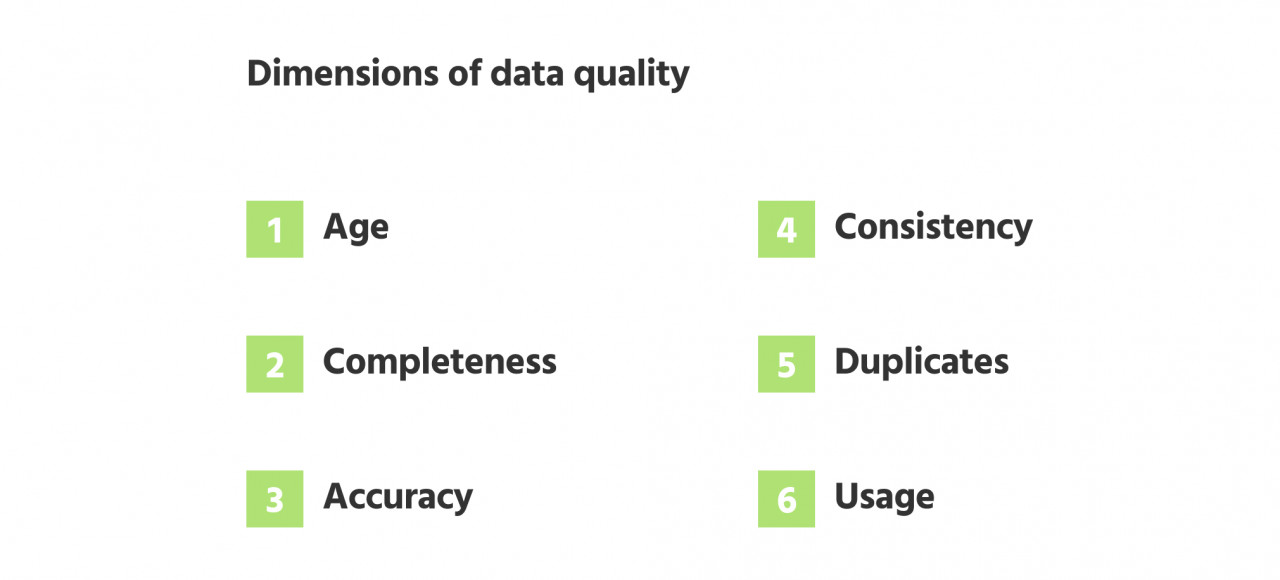Select your language
Blog
Dive into the world of Marketing Automation:
Practical & helpful knowledge that makes your daily life with Marketing Automation easier!
An introduction to data quality
What is data quality?
In a broader sense, the term data quality involves assessing how well data is usable for a particular purpose. Poor data quality can have a direct impact on business performance. This can include:
- Reduced revenue
- Wasted time and resources
- Reduced customer service
- Reputational damage
There are several dimensions by which data quality can be measured:
Age
Data such as customer information can change frequently. People change jobs, they move or they change their email address. Outdated email addresses can become a problem, especially in email marketing, as they can lead to hard bounces and thus damage the sender's reputation.
Completeness
Incomplete data records cost time and money. Therefore, it is important to establish standards within the company as to which information is necessary. This information must be requested on all channels. This also makes personalisation or automation easier to implement.
Accuracy
The data collected should represent reality. Incorrect data can, for example, come from faulty measurements or incorrect information from people. Validation rules, for example, can help here. A validation rule is a rule for an input field that checks whether the data entered by the user meets certain criteria before the user can save the data record.
Consistency
Collected data should meet certain predetermined rules, such as formatting, spelling, and language.
Duplicates
When you have two or more records that represent the same entity, we'll refer to them as a duplicates. Duplicates can lead to processes being executed twice, for example, customers being contacted more than once by different people. Implementing duplicate management ensures that duplicates are detected and merged correctly.
Usage
Use the data or delete it. Say goodbye to data that has no intended use.
Data quality challenges
Nowadays, it is relatively easy to collect data. Nevertheless, the challenges have not diminished. This includes, for example:
- The diversity of data sources often include different data types and complex data structures, increasing the difficulty of data integration.
- The volume of data today is enormous and it is difficult to assess data quality within a reasonable period.
- Data changes very quickly and the "validity" of data is often short, requiring higher demands on processing technology
Data management plan
To overcome the challenges, it is useful to create a data management plan. A typical data management plan contains standards for creating, processing, and maintaining data. You should consider the following standards:
Naming
Establish naming conventions and implement them consistently. For example, how to deal with abbreviations or suffixes (Inc., Corp., etc.).
Formatting
Find out how different types of data (e.g. date or currency) need to be formatted and ensure that new data is entered in the desired format.
Workflow
Determine a process that incoming data must go through. This includes how and when data is generated, reviewed, updated, and archived.
Data quality
Set standards for data quality and monitor whether these standards are achieved. Ideally, quality should be measured with a score.
Security and permissions
Determine appropriate levels of data protection. Ensure that legal and contractual obligations are met.
Conclusion
Improving data quality is a critical endeavour, as data serves as the foundation for all activities of an organisation. Poor data quality leads to inaccurate reporting, which leads to wrong decisions and economic losses. Dealing with data requires planning and effort to overcome today's data-related challenges.
References
https://trailhead.salesforce.com/content/learn/modules/data_quality/data_quality_assess_your_data
https://trailhead.salesforce.com/content/learn/modules/data_quality/data_quality_improve_quality
https://towardsdatascience.com/an-introduction-to-data-quality-951cc6fe0274
https://datascience.codata.org/articles/10.5334/dsj-2015-002/







